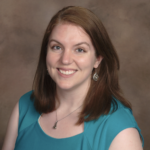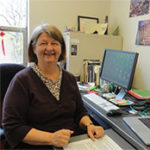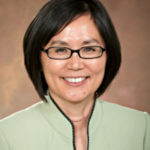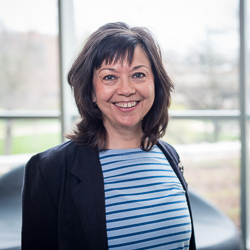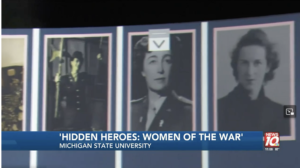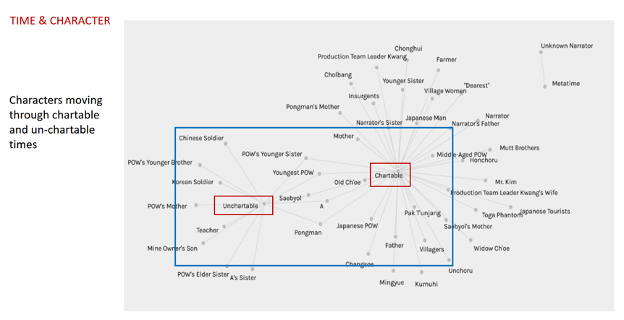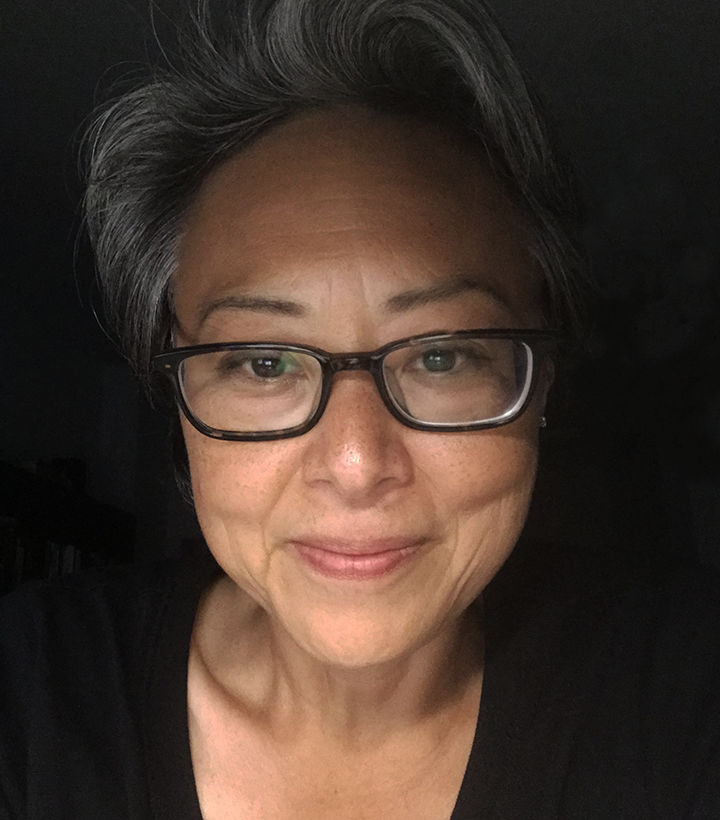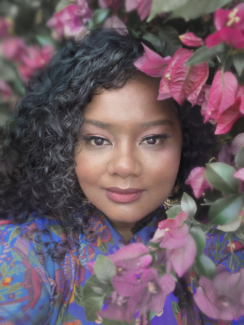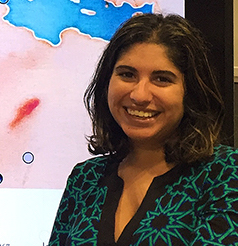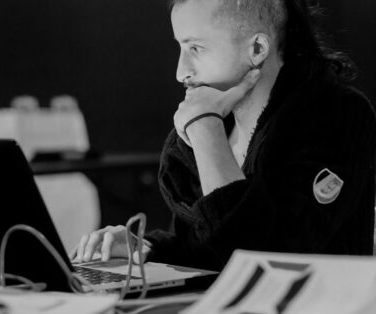2022-2023 Annual Report
Letter from the Director
What does it mean for us to think of DH@MSU as a community? The notion of community is complex and far too easily misused. We’ve all gotten the kinds of institutional messages that gesture vaguely to those who receive them as a “community” without really considering the sources of our connectedness or the barriers that many experience that prevent such connection. Those messages sometimes even use “community” as a disciplinary tactic, using what it means to be one of us to silence dissent.
Part of the problem with these uses of “community” is the notion that community is a fixed state, a thing that can be pointed to, rather than a set of beliefs and actions and relationships that are constantly in motion. Communities are always in the process of growing, or shifting, or withering. From that perspective, it’s impossible to think about DH@MSU as a community without focusing on the ways that we are constantly engaged in trying to create and facilitate ongoing acts of community. It’s those acts, and the relationships and collaborations that we hope might spring from them, that we hope will define what DH@MSU can be, and in particular what we hope you will help us build.
The need for that community has never felt more pressing than it has this year, as we have all struggled to find our way back to campus, first after the still-ongoing COVID-19 pandemic, and then after the violence that shook us all. In the year ahead, we’ll be engaging in some strategic planning, and to that end we started a series of conversation in the spring about ways we can better support and promote you and your work. We’ll be reaching out to continue this conversations, and we hope you’ll help us think about ways that we can do more, and better, in building the DH@MSU community.
– Kathleen Fitzpatrick, Director of Digital Humanities
Table of Contents
Core Faculty
Affiliated Faculty
Faculty MeetingS
DH@MSU held faculty meetings in December 2022 (agenda slides) and April 2023 (agenda slides) in conjunction with the end of semester celebrations.
Discussion at the Fall meeting lead to the creation of a Liaison program between DH@MSU and units across campus, which will be piloted in 2023-24.
During the year, the faculty voted to update the Community Agreements and to change the by-laws to close the Research Committee. The tasks that the Research Committee undertook to provide funding to the community will be the purview of the Advisory Committee moving forward,
Faculty meetings will continue to be held as part of each End of Semester Celebration moving forward.
DH@MSU Strategic Thinking
Advisory committee
The Advisory Committee discussed strategies for improving faculty engagement in DH@MSU and began strategic work to develop partnerships on the research and curriculum front for DH with units across campus.
Members
Stephen Rachman (2023)
Stephanie Vasko (2023)
Catalina Bartlett (2024)
Kate Birdsall (2024)
Devin Higgins (2024)
Katie Knowles (Graduate Student Representative)
Kathleen Fitzpatrick (ex-officio) (Chair)
Kristen Mapes (ex-officio)
New Members for 2023-2024
Jesse Draper
Matt Handelman
Jon Keune
Alice Lynn McMichael
Amanda Tickner
Strategic thinking sessions
Retrospective
This activity asked attendees to consider the DH@MSU events and activities they’ve participated in in recent years and consider whether we should continue them, stop them, invent ways to do them differently, or take entirely new actions altogether.
PRIORITIES
Considering the things we might do in the years ahead, attendees were asked to map them on a scale of low effort to high effort, and from low value to high value, helping us figure out what we should do right away (low effort, high value), what we should do next (high effort, high value), what we should do when there’s time (low effort, low value), and what we should not do at all (high effort, low value).
resourcEs
Having established those priorities, we then asked attendees to take a look at the DH@MSU budget and help us think about how we might best dedicate resources in order to reach our goals.
Curriculum
Undergraduate Minor Name Change to Digital studies in the arts and humanities
Over the course of the academic year, the Curriculum Committee discussed the structure and framing of the undergraduate minor. These discussions illuminated the limitations of the phrase “digital humanities” in the context of attracting students across majors and in connecting with humanities-based majors. Based on research into other universities’ models and considering how the minor can best fit in among curricular offerings at MSU, the Committee proposed changing the name of the Minor to Digital Studies in the Arts and Humanities. The name change is planned for Fall 2024.
This name change makes known the openness and flexibility inherent in the minor and invites students to think broadly and creatively about how the digital intersects with their own work. Shifting from “humanities” to “arts and humanities” explicitly highlights the arts as part of the program alongside the humanities. This level of inclusivity invites collaboration from across the university and will help create the buy-in that the program needs for its longevity.
Read more about the name change in the Rationale Document.
Curriculum Committee
The Curriculum Committee reviewed Graduate Certificate portfolios and worked to improve the Undergraduate Minor by: developing a process for adding electives to the program, creating a Capstone Course, and improving communication through a flyer and website redesign.
Members
Zach Kaiser (2023)
Xinqiang Li (2023)
Adam Liszkiewicz (Fall 2023)
Kirk Astle (2024)
Dean Rehberger (2024)
Matt Rossi (2024)
Kate Topham (2024)
Danielle Willcutt (Graduate Student Representative)
Kathleen Fitzpatrick (ex-officio)
Kristen Mapes, Chair (ex-officio)
New Members for 2023-2024
Zach Kaiser (returning)
Ethan Watrall
New Course: Exploring DH: Practice, Methods, and Speculation
The English Department and Digital Humanities collaborated to propose a new course, ENG/DH235, which will introduce students to DH through work in the Digital Humanities and Literary Cognition Lab.
This course will be offered each Fall and Spring semester beginning in Spring 2024 and will provide hands-on experience with DH projects alongside theoretical discussions of DH and literary topics.
Graduate Certificate
Congratulations to the following graduate students who received the Digital Humanities Certificate in 2022-2023:
- Katie Carline (History)
- June Oh (English)
- Soohyun Cho (English)
- John Vsetecka (History)
DH340 Class Project in the 360 Room & in the News
DH340 students in Spring 2023 developed two DH projects in conversation with the Monuments Men and Women Foundation. The Hidden Heroes project highlighted women involved in the return of art stolen by Nazis in WWII. Students used the 360 Room in the DSL and other technologies to create an exhibit for the public. The project is available via a website and was featured by local news WILX and WLNS.
Teaching Highlights
The Newsletter began highlighting teaching activities over the course of the academic year. These highlights are also available for reference on the DH@MSU website.
ANP420 (Languages & Cultures) worked with LEADR in Fall 2022
LEADR worked with students to create Chicano/Latino Studies Oral Histories in Spring 2023
DH Intern in the Digital Scholarship Lab
In the 2022-2023 academic year, Autumn Boyd served as the DH Intern in the Digital Scholarship Lab. Autumn is a Physiology Major, Minoring in Digital Humanities.
In the internship, she worked with faculty projects as part of the Incubator Program, ran VR open hours, staffed the desk in the Lab, and helped with class visits.
The DH internship in the DSL will continue in the next academic year, serving as a capstone experience for a student in the Minor.
Events
Engagement & outreach committee – members
The Engagement & Outreach committee organized events for the community and began developing an outreach initiative to alumni of the undergraduate minor and the graduate certificate.
Members
Max Evjen (Chair)
Kristen Mapes
Michael Rodriguez
Jesse Draper
Katie Knowles (Graduate Student Representative)
Taylor Hughes-Barrow (Undergraduate Student Representative)
New Members for 2023-2024
Joyce Meier
Denice Blair
DH@MSU continued its tradition of running THATCamps in August and in January of each year. In 2022-23 we began a routine of holding the August THATCamp in person and the January one virtually.
THATCamp is a gathering where the agenda is set by attendees on the day of the event based on what people want to learn and/or share. These events gave community members an opportunity to network, explore skills and interests, and share about their work.
Planning Teams:
August 2022 – Max Evjen, Katie Knowles, Taylor Hughes-Barrow, Tim McRoberts
January 2023 – Max Evjen, Dani Willcutt, Daniel Fandino
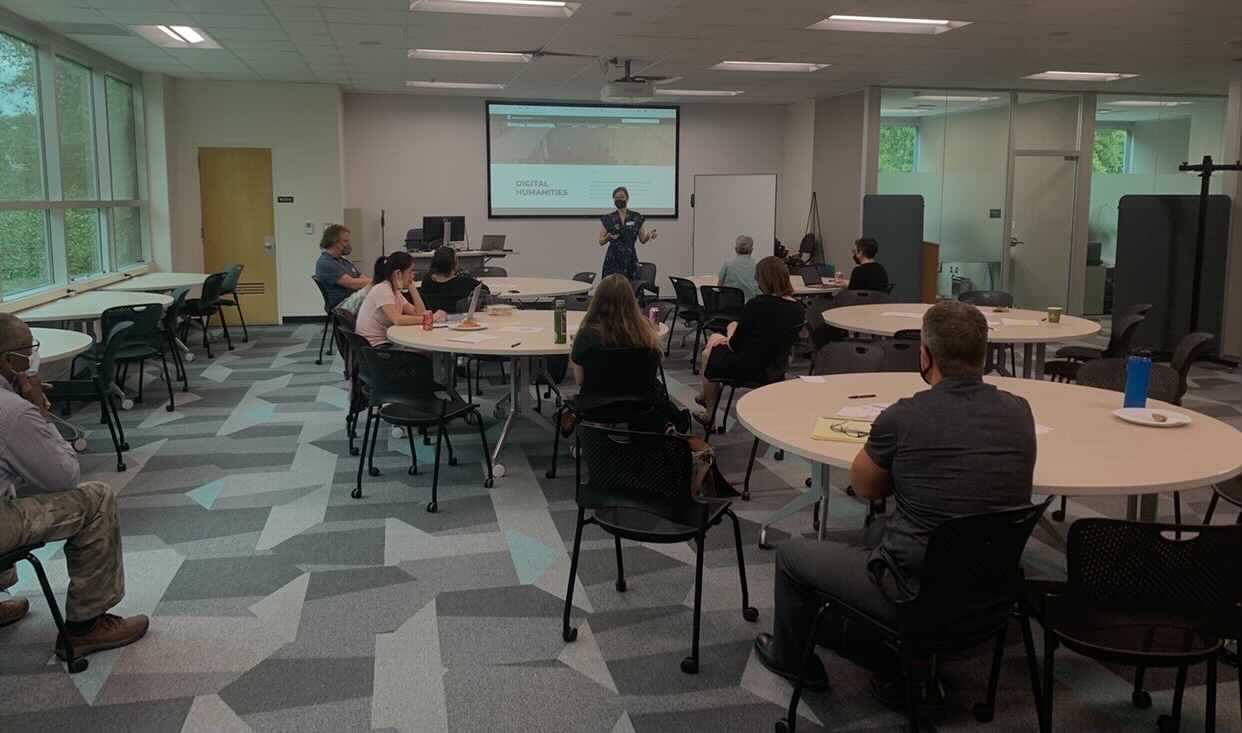
In Fall 2022, the DH@MSU community heard from Seed Grant recipients about their projects and upcoming developments in their work. Presenters and projects were:
- Catherine Ryu and Olivia Hale, “Movements through Time and Space: Visualizing a Literary Journey by Ethnic Koreans in China”
- Christina Boyles, “AREPR and Omeka S: Developing Tools for the DH Community”
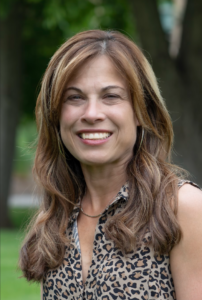
DH@MSU continued its fifth annual Distinguished Lecture in Fall 2022 with Kimberly Christen, Professor of Digital Technology and Culture at Washington State University, on “Always Coming Home: Relations of Repair in the Digital Humanities”
Locus is run annually as a showcase for work (nascent, in progress, or completed) around a theme. This year focused on work with comics and showcased the following work:
- Digital Streaming or Freezing of Chinese TV Series – Sheng-mei Ma
- Releasing the Imagination in Qualitative Research through Self-made Comics – Dustin DeFelice
- Days of Future Past: Comics as Metadata, Wikidata, and data imaginary – Julian Chambliss and Kate Topham.
Find the program, including presentation descriptions, here.
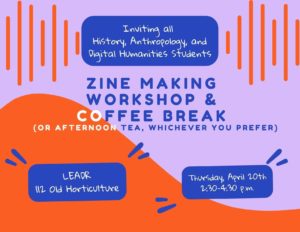
Global Digital Humanities Symposium
The 8th annual Global Digital Humanities Symposium was held virtually and in-person March 13-17, 2023.
Over 100 people from over 18 countries attended through the Zoom meeting and the livestream over the course of the three days, taking advantage of the closed captions and the live interpretation, which supported English, Spanish, and Mandarin Chinese participation in the Symposium.
Thanks to H-Net for all their support of the Symposium through their generous sponsorship.
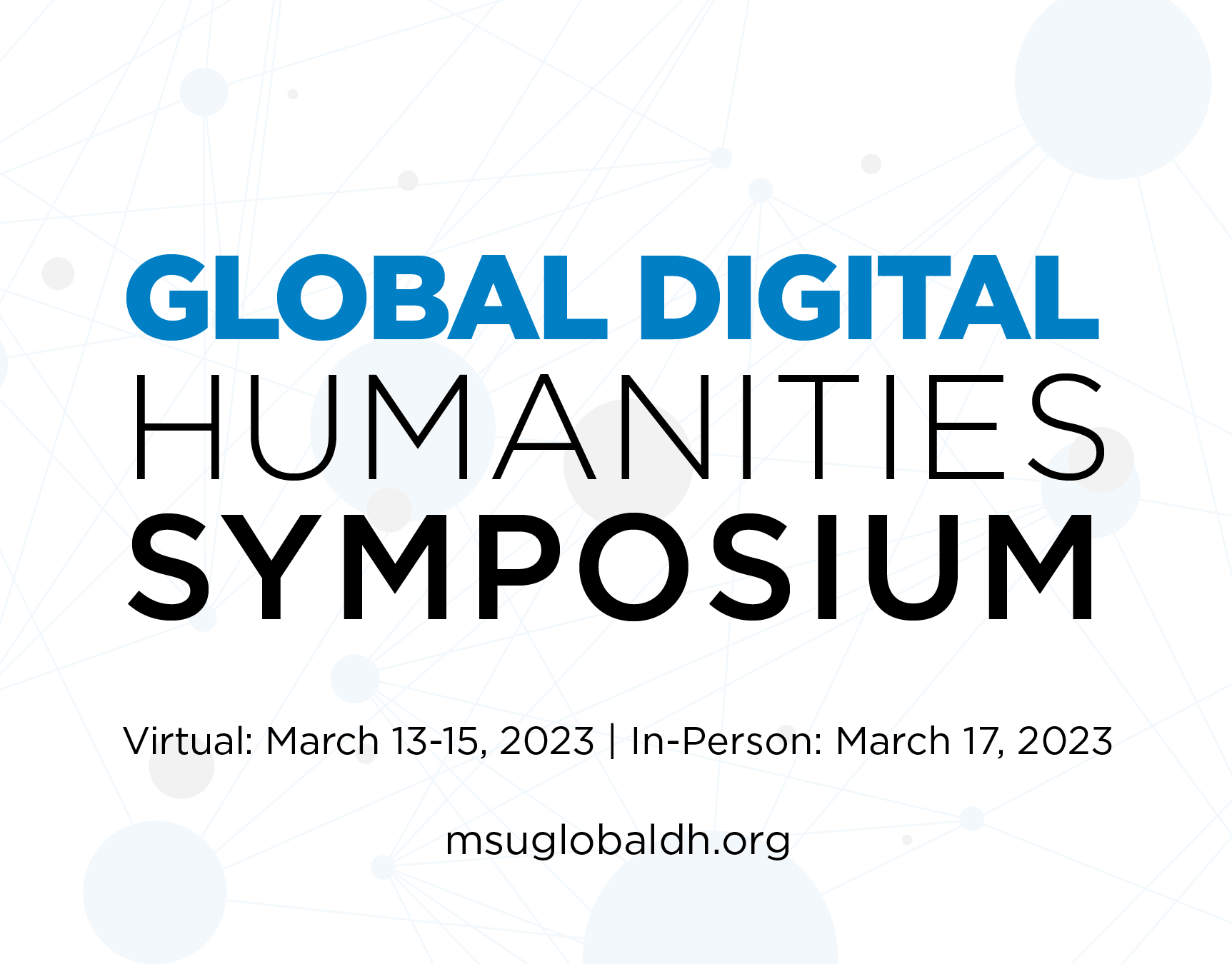
The Symposium Planning Committee included people from around MSU (Max Evjen, Devin Higgins, Taylor Hughes-Barrow, Kristen Mapes, Kate Topham) and beyond (Ayodele James Akinola, Shreyes Balachandran, Heather F. Ball, Arun Jacob, Irshad Ibrahim Kandakeel, Viola Lasmana, Ysabel Munoz, Merve Tekgurler).
This year the Symposium held an on-campus event for the first time in three years. Over 50 participants gathered in East Lansing for a full day of presentations and community building.
Elaine Gan gave the first keynote address, titled “Timing Change: Miracles, Monsters, and Machines.
Thenmozhi Soundararajan gave the second keynote, titled “Caste and Tech: Terrains of Resistance and Resiliance”.
Roopika Risam served as a keyonte respondant, leading a discussion among the virtual keynote presenters.
João Beira gave an in-person keynote presentation titled “Merging the physical with the digital> A case study for the future of digital Art.”
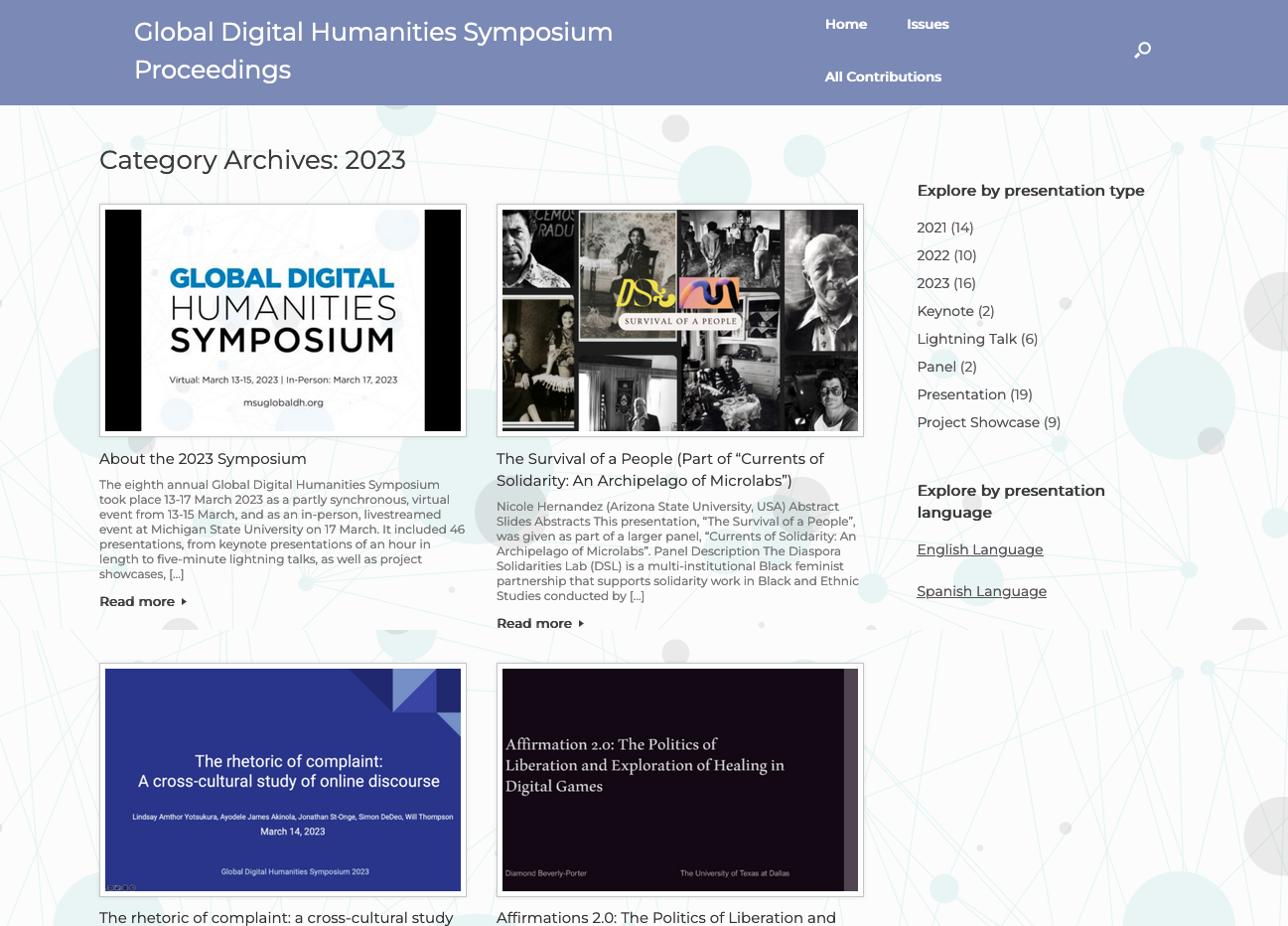
The Symposium gathered work from the event together into a Proceedings website, building on the launch of the Proceedings site in 2021, using the Humanities Commons platform to deposit materials in the CORE repository and to showcase the work on a site. Fifteen presentations are included in the 2023 issue.
Digital Engagement
Newsletter
In January, DH@MSU launched a new monthly newsletter geared toward undergraduate students. The “main” newsletter continues twice per month, and across the two publications, the team launched new features during the year. New material for the newsletter include Teaching Highlights, Research Highlights, What DH Means to Me, and Student Profiles.
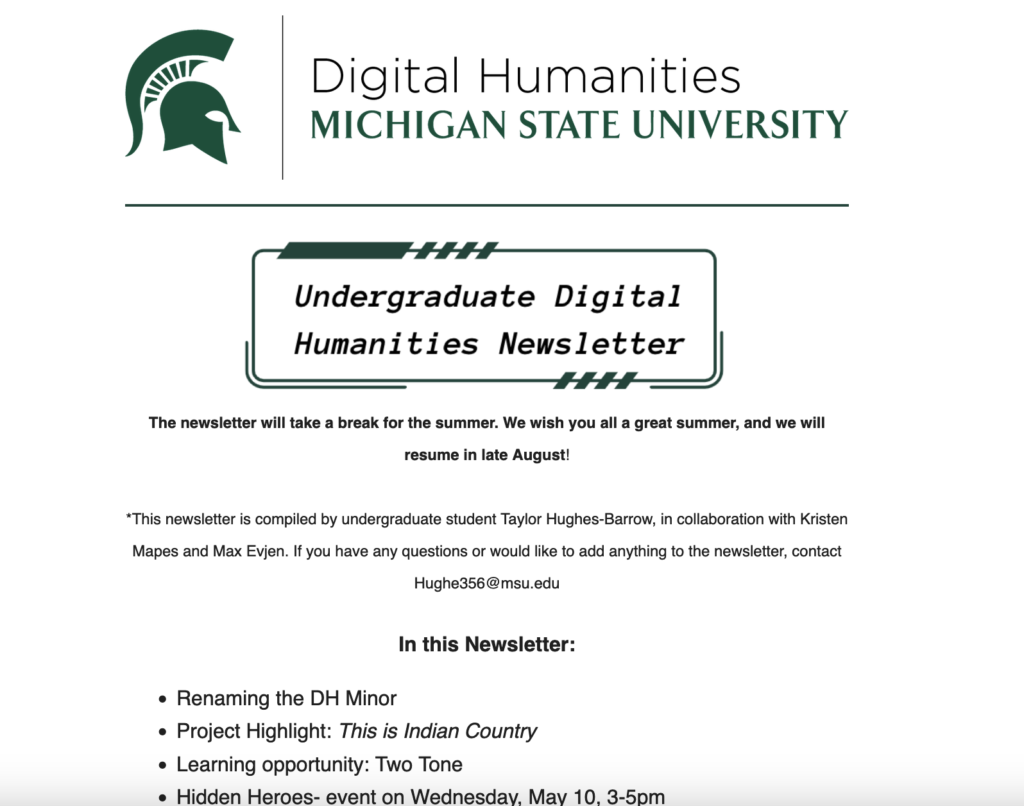
Website & Beyond
- Newsletter (229 subscribers)
- Email listserv (204 subscribers)
- Slack (247 members)
- @DHatMSU Twitter (480 followers)
- @DHatMSU@h-net.social Mastodon (40 followers)
- @MSUGlobalDh Mastodon (48 followers)
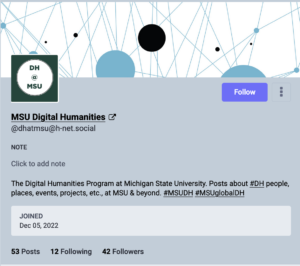
Research
Research Committee
The Research Committee launched the Professional Development funding program to replace Microgrant Funding, awarded Seed Grant Funds, and worked with the Digital Scholarship Lab to review Graduate Arts Fellowship applications.
Members
Kuhu Tanvir (Chair)
Matthew Handelman
Tianyi Kou-Herrema (Graduate Student Representative)
Kathleen Fitzpatrick (ex-officio)
Kristen Mapes (ex-officio)
Closing the Research Committee
Over the years, the Committee has done very important work in envisioning and managing the Professional Development and Seed Grant funding programs, which support DH scholars across campus. These programs will be continued and administered by the Advisory Committee moving forward.
The Professional Development Funding program supports DH activity with awards up to $500. Faculty and students are welcome to apply at several points in the academic year for support.
Awardees in Fall 2022:
- Matt Handelman (faculty) – German Studies Association Conference presentation
- Tianyi Kou-Herrema (grad student) – DH in the German-speaking Countries Conference presentation
- Taylor Mills (grad student) – Law and Society Association Conference presentation
Awardees in Spring 2023:
- Catherine Ryu (faculty) – funding student worker for Data Visualization project
- Alison Dobbins (faculty) – New Music Gathering Conference presentation
- Michael Rodriguez (librarian) – touch screen for digital exhibits at REO Transportation Museum
- Taylor Hughes-Barrow (undergrad student) – HASTAC Conference presentation
In its sixth year, the Seed Grant Funding program provides funds up to $2000 to support DH projects over the summer. Funding recipients present on their work at the Research Showcase event in the Fall and share project reports.
Awardees for Summer 2023 were:
- Danielle Willcutt, “Mapping Food Networks”
- Kara Haas and team, “Unlocking Squareland Mysteries: The Development of Squareland Digital Field Trips”
- Matthew Rossi and Garth Sabo, “Marsh Time”
Supporting Initiatives in the Digital Scholarship Lab
For its third year, the Project Incubator in the DSL supported three projects from November 2022 through April 2023, with two of the projects presenting at the DH@MSU end of semester celebration in the Spring.
The DH@MSU team supported the program this year, with Kate Topham directing it and coordinating with the DSL staff, DH intern in the DSL, and project teams.
Incubator Projects for 2022-2023:
- Anna Kirkwood Graham (Romance & Classical Studies faculty) – The Circa instans of Matthaeus Platearius project [digital edition]
- Eric Tans (Environmental. Sciences Librarian) – Close Beside the Winding Cedar project [narrative mapping]
- Catalina Bartlett (WRAC faculty) – Latina/x Artists Books as Digitized Bodies (of Work) [3D models]
The Graduate Arts Fellowship, begun in 2020, is a joint program between the College of Arts and Letters and MSU Libraries to support the creation of art that takes advantage of the technologies and expertise offered through the Digital Scholarship Lab.
For 2023, the DH@MSU Research Committee and some members of the DSL Faculty Advisory Board (which otherwise was on hiatus in 2022-23) reviewed the 8 applications and selected the fellow.
Adeline Newmann, MFA graduate student in the Art, Art History, and Design Department, received the $5000 summer Fellowship to support work on her project, “Virtual Studio.”. Her work will be presented in September 2023 through a workshop and an artist’s showcase in the Digital Scholarship Lab.




